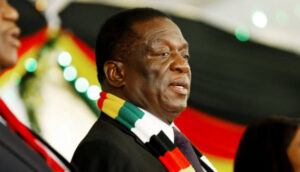A faction of Zimbabwe’s liberation war veterans has publicly demanded that President Emmerson Mnangagwa step down, accusing him of corruption, nepotism, and economic mismanagement. The veterans, who have long been associated with the ruling Zanu-PF party, expressed frustration over the country’s worsening economic crisis and the failure of Mnangagwa’s government to deliver on its promises since taking power in 2017.
At a press conference streamed online, Blessed Runesu Geza, a war veteran and central committee member of Zanu-PF, made a direct appeal for Mnangagwa’s immediate resignation. He criticized the president for failing to honor the sacrifices made during Zimbabwe’s liberation struggle, citing the poor state of the economy, rampant corruption, and what he described as a descent into lawlessness.
Geza’s remarks reflect growing internal discontent within Zanu-PF. He accused the president of protecting corrupt individuals while ordinary citizens continue to suffer. “We are saying — as war veterans — enough is enough. You have shown that you have failed. It can’t get any worse,” he declared in Shona.
He further warned that if Mnangagwa refuses to step down voluntarily, the people could use constitutional means to remove him. His comments highlight the increasing frustration among former fighters who once played a key role in securing the party’s hold on power.
Despite the strong words from Geza, the Zanu-PF leadership has brushed off the calls for Mnangagwa’s resignation. Party spokesperson Farai Marapira dismissed the demands as mere “ranting” that do not reflect the party’s official position.
“The party position is clear; the party position is given through clear channels,” Marapira said in response. “People who speak their mind outside of the party, that’s part of democracy. But anything else is just ranting.”
Also, read: Super Eagles Coach Eric Chelle Eyes AFCON Glory, Driven by Revenge
Zanu-PF’s leadership recently endorsed a resolution supporting Mnangagwa’s bid for a third term in 2028, contingent on securing constitutional amendments to extend his tenure.
Political experts believe the war veterans’ dissatisfaction underscores deeper divisions within Zanu-PF. Eldred Masunungure, a political science professor at the University of Zimbabwe, noted that while the veterans’ frustration is real, their ability to force a leadership change remains uncertain.
“The political climate is difficult to predict, but it is clear they are expressing their exasperation with the direction the country has taken in recent years,” Masunungure explained. “However, whether their calls will lead to tangible change is highly uncertain.”
Independent political analyst Brighton Chipamhadze echoed similar sentiments, emphasizing that the veterans’ demands reflect an internal power struggle within Zanu-PF. “There are individuals benefiting from Mnangagwa’s rule who want to extend his term, but there is also a faction within the ruling party that strongly opposes it,” he said.
Zimbabwe’s constitution, adopted in 2013, allows for the removal of a sitting president through parliamentary impeachment if lawmakers determine that he is incapacitated. However, given Mnangagwa’s firm grip on power and Zanu-PF’s control of the legislature, such a scenario remains unlikely—at least for now.
At 81 years old, Mnangagwa is one of Africa’s oldest leaders, and if he remains in power until 2028, he will be 86. While the calls for his resignation may not immediately shake his position, they signal rising tensions within his party and could shape Zimbabwe’s political landscape in the coming years.

